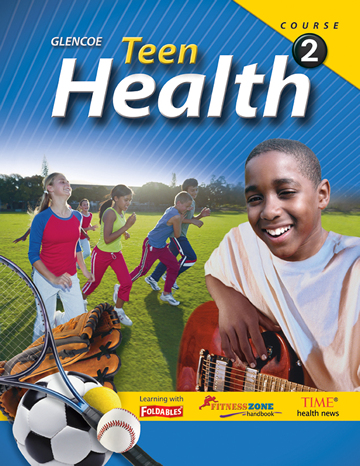Teen Health Course 2Chapter 6:
Building Healthy RelationshipsStudent Web Activities - Teacher ContentLesson 3 Answers - Some things that would help a teen make new friends include:
- Be friendly to people
- Listen when people talk to you
- Do not make fun of people
- Strike up conversations with other people in your classes
- If you excel in a subject, help out the other students in your class
- Laugh and have fun
- One of the best ways to find and keep new friends is to look for people who share the same interests, values and goals.
- Some ways to be a good friend to someone include:
- Reach out to the others who share your interests
- Sit with your friends at lunch
- Invite your friends to join you in the activities you all like
- Listen to their thoughts and feelings
- Share your thoughts and feelings with them
- It is important to share your feelings with a friend whose behavior is bothering you because:
- The other person may not be aware that he or she is causing you to hurt
- The other person will not know what is going on, unless you share your thoughts.
- A friendship is not worth keeping if you cannot be yourself or if you have to do things you do not like to do.
Additional Resources for Teachers Below are some additional resources that talk about making and keeping friends. It might be fun to have teens write stories of their own experiences – good and bad – with friendships.
- Healthy Relationships: http://www.youngwomenshealth.org/healthy_relat.html
- Teens Health -What it Means to be a Friend: http://kidshealth.org/teen/your_mind/relationships/friend_comments.html
- By Teens: http://www.pamf.org/teen/byteens/friendship.html
- Friendship: http://www.youngwomenshealth.org/friendship.html
- Relationships and Health: http://www.cyh.com/HealthTopics/HealthTopicDetails.aspx?p=243&np=291&id=2182
Lesson 4 Answers - Healthy relationships are built on a foundation of giving and getting respect.
- In a relationship you have the right to:
- be treated with respect always
- be in a healthy relationship
- not be abused—physically, sexually, or emotionally
- keep your body, feelings, beliefs, and property to yourself
- have friends and activities apart from your boyfriend or girlfriend
- set limits and values
- say no
- feel safe in the relationship
- be treated as an equal
- feel comfortable being yourself
- leave a relationship
- The different kinds of relationship abuse include physical, sexual, and emotional/verbal.
- Some signs of an unhealthy relationhsip include:
- being put down
- being yelled at
- being shoved
- feeling controlled
- feeling ignored
- being embarrassed in front of others
- being told what you can or cannot wear
- made to feel afraid of your boyfriend or girlfriend
- Steps you can take to get the support you need to avoid being in an abusive relationship are:
- get medical help if needed
- know that the abuse is not your fault
- talk with someone you trust
- think things through to recognize what’s really going on
- make a safety plan
- surround yourself with friends and family for support
- The ten dating responsibilities that can keep relationships respectful and prevent abuse are:
- to determine your limits and values
- to respect your boyfriend’s or girlfriend’s limits, values, feelings, and beliefs
- to refuse to abuse—physically, sexually, or emotionally
- to be considerate
- to communicate clearly and honestly
- to give your boyfriend or girlfriend space to be his or her own person
- to not exert power or control in the relationship
- to compromise when needed
- to admit to being wrong when appropriate
- to ask for help from friends, family, and trusted adults
Additional Resources for Teachers Below are some additional resources that talk about healthy versus unhealthy relationships and what can be done to end abuse. You might want to have students create a panel to discuss creative ways they could educate other teens about preventing abuse.
- Kidscape: http://www.kidscape.org.uk/childrenteens/protectyourself.shtml
- Good Character: http://www.goodcharacter.com/BCBC/SpeakingSex.html
- Teen Ink: http://www.teenink.com/Past/1997/7905.html
 | 
















